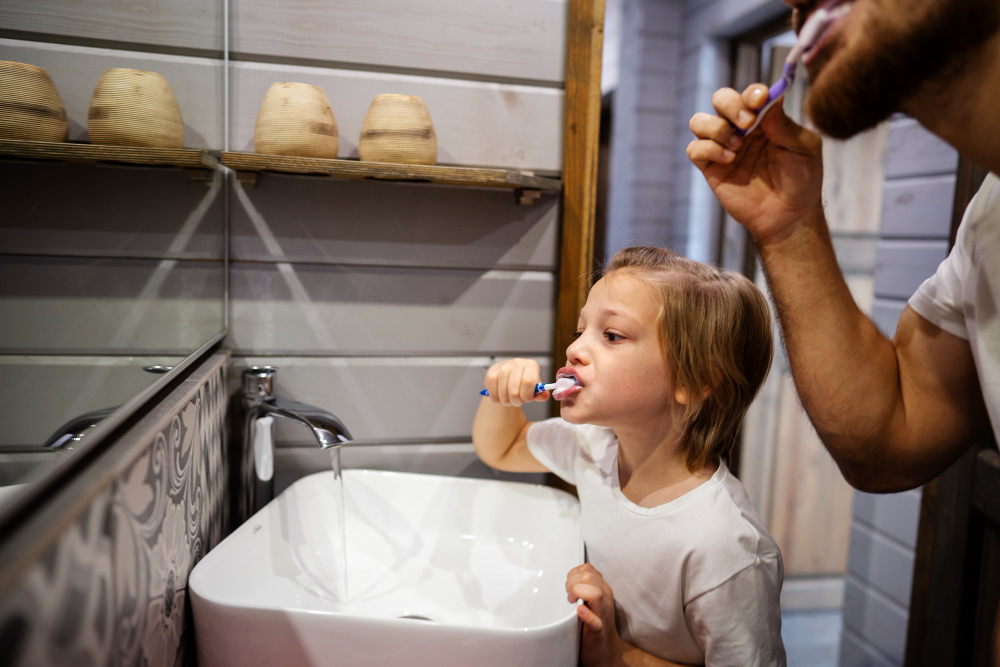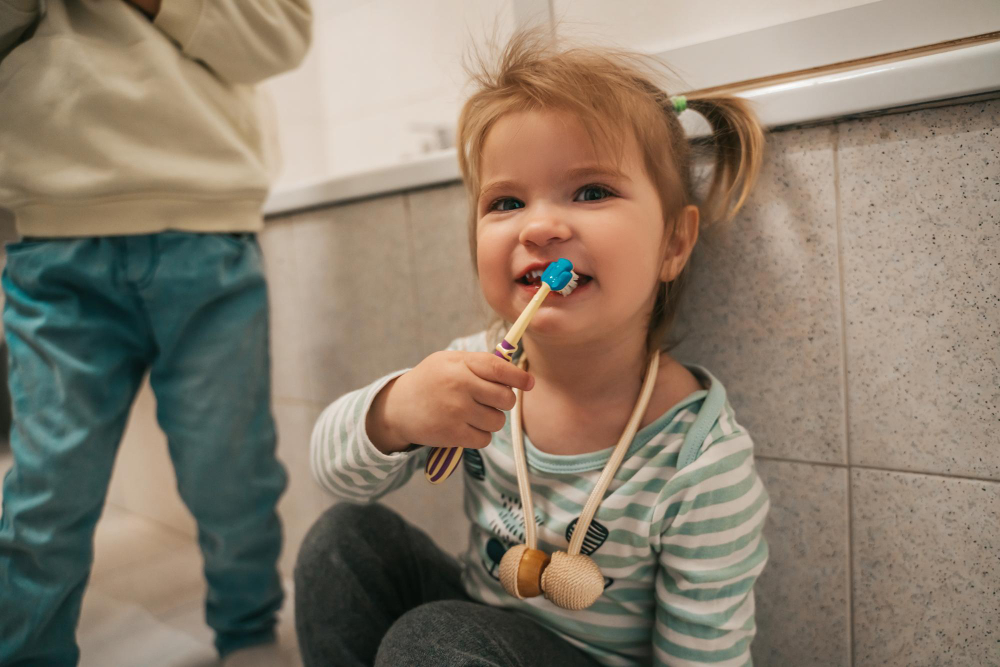12Jul
Shining Smiles: A Guide to Caring for Your Little One’s Teeth
As your little one grows and explores the world, a whole new set of adventures awaits, including the exciting (and sometimes painful) journey of teething. But with those adorable pearly whites comes the responsibility of keeping them healthy and strong.

Brushing Basics:
It all starts with good habits! You can begin caring for your baby’s oral health even before their first tooth erupts. Here’s how:
- Gently clean gums: Use a soft, damp washcloth to wipe your baby’s gums after feedings. This removes bacteria build-up and gets them accustomed to having their mouth cleaned.
- Welcome the first tooth: When that first tooth breaks through the gums, it’s time for a brushing upgrade. Use a soft, baby-sized toothbrush with just water. Gently brush in circular motions along the gum line twice a day – after breakfast and before bedtime.
- Fluoride power up: Around 18 months, you can introduce a rice-sized amount of fluoride toothpaste. Fluoride strengthens enamel and prevents cavities. Always supervise brushing and ensure they don’t swallow the toothpaste. A pea-sized amount is enough for children over 3, transitioning to a small smear by age 5.
- Flossing fun (sort of): While flossing might not be the most exciting activity for your little one, it’s important to start incorporating it into their routine around age 2 or 3. There are child-sized flossers that make the process easier.
- Don’t be afraid to make brushing time exciting: Sing songs, use colourful toothbrushes, or let your child choose a fun toothpaste flavour (with fluoride, of course). This will help create positive associations with brushing and make it a more enjoyable experience for everyone.
Diet Do’s and Don’ts:
- Limit sugary drinks: Sugary drinks like juice, or adding sugar to your little one’s tea, can contribute to tooth decay. The bacteria in your child’s mouth feed on sugar, producing acid that eats away at tooth enamel. This can lead to cavities even in baby teeth. Water is the healthiest choice for hydration and helps keep your child’s mouth clean.
- Healthy Snacking: Choose healthy snacks like fruits and vegetables over sugary treats wherever you can. Fruits and vegetables provide essential vitamins and minerals for your child’s development, and some fruits like apples can even help stimulate saliva production, which washes away bacteria in the mouth. The more used to healthy snacks your child gets, the better choices they will make in the future.

First Dentist Visit:
Your child’s first birthday is a time for celebration, but it’s also a crucial milestone for their oral health. It is recommended scheduling your child’s first dental visit by their first birthday, or within 6 months of their first tooth erupting. This may seem early, but there are many important reasons for this recommendation:
- Early Detection: A paediatric dentist can examine your child’s mouth for any potential issues like tongue-tie, misalignment, or developmental problems. Early detection and intervention can make a big difference in preventing future complications.
- Habituation: Getting your child used to the dental environment in a positive way is key. A first visit at a young age allows them to build trust with the dentist and become familiar with the sights, sounds, and tools used during an exam. This can help prevent anxiety about future dental visits.
- Education: Paediatric dentists are experts in caring for children’s teeth. During your child’s first visit, the dentist will provide you with personalised advice on proper brushing techniques, fluoride use, and healthy dietary habits – all essential for promoting good oral health from the start.
- Prevention is Key: Regular check-ups with a paediatric dentist allow for early detection and treatment of potential problems like cavities or gum disease. Catching issues early can save your child discomfort and more extensive treatment down the road.
The Dentist is Your Friend:
- Talk about it positively: Explain to your child that the dentist is a doctor who helps keep their teeth healthy and strong.
- Be prepared: Use positive language and read them children’s books about going to the dentist.
- Role Play: Pretend play with toy dental tools at home can help familiarise your little one with the instruments they might see during their visit, and role play with both you and your little one playing the roles of dentist and patient.

Remember, a healthy smile starts early! Think of it like building a strong foundation. Consistent brushing, a healthy diet, and regular dental care will equip your little one with the tools they need to maintain strong, healthy teeth for a lifetime. And let’s not forget the confidence that comes with a bright, healthy smile!
Don’t hesitate to ask your paediatrician any questions you may have about your child’s teeth!
